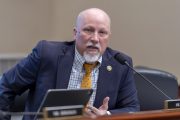
On February 3, 2017, freshman Congressman Matt Gaetz (R-Fla.) introduced H.R. 861, a bill to abolish the Environmental Protection Agency (also known as the EPA). Representative Gaetz’s bill, which is only one sentence long, states, “The Environmental Protection Agency shall terminate on December 31, 2018.”
On a video posted on his Facebook page, Congressman Gaetz explained, “For six years in the [Florida state] legislature, I had a front row seat to the failures of the federal government in protecting the environment.” Gaetz continued, “The question isn’t whether to protect the environment. The question is who is better equipped to actually do that?”
Gaetz further explained that his bill wouldn’t affect the 1963 Clean Air Act or the 1972 Clean Water Act. Instead, such responsibilities would return to the states and local communities to address. “The Clean Air Act and the Clean Water Act, they would stay in effect after my bill, but enforcement of those laws would fall to state and local governments,” Gaetz said, further adding, “Local communities tend to be able to react a lot quicker.”
Congressman Gaetz’s bill is a good first step in restoring federalism, returning to the states and the people those powers not delegated to the federal government, in accordance to the 10th Amendment of the Constitution, with respect to the environment. The Constitution does not grant the federal government any power to make environmental legislation or policies. As for the EPA, it has only been around for a little more than 40 years.
History of the EPA
On February 18, 1969, responding to the then-increased public concern about the potential impact of human activity on the environment, Senator Henry “Scoop” Jackson (D-Wash.) introduced S. 1075, which eventual became known as the National Environmental Policy Act (NEPA). Following passage in the then-Democrat Party-controlled Senate and House of Representatives, Republican President Richard Nixon signed NEPA into law on January 1, 1970. Under NEPA, the Council on Environmental Quality (CEQ) was created within the Executive Office of the President (EOP).
On July 9, 1970, President Nixon submitted to Congress Reorganization Plan No. 3, an executive order consolidating the environmental responsibilities of different federal agencies to form the Environmental Protection Agency as “a strong, independent agency.” In his message to Congress explaining the order, President Nixon proposed, “pulling together into one agency a variety of research, monitoring, standard-setting and enforcement activities now scattered through several departments and agencies.” Following House and Senate committee ratifications of Reorganization Plan No. 3, the EPA was formally established on December 2, 1970.
Threat to Private Property Rights
Despite whatever good intentions its creators such as President Nixon may have had in mind when they set out to establish the unconstitutional agency, it quickly deviated from its stated mission of protecting the nation’s environment to being a tool for radical environmentalists to impose anti-property rights regulations, which threaten the very heart and soul of both individual and economic freedom.
Most recently, in 2015, the EPA established new rules expanding their control over essentially all waterways. Under the guise of “clarifying” what waterways fall under its protection, the EPA expanded the definition of the “navigable waters” of the United States that its jurisdiction is limited to. Traditionally understood to just mean large bodies of water capable of servicing the transportation for interstate commerce, the 2015 EPA rules expanded “navigable waters” to also include virtually every type of water body from farm ponds and ditches to the smallest streams.
Home owners, farmers, or ranchers who have even the smallest streams flowing through their property must now contend with distant, unelected, and often unreachable bureaucrats in Washington, D.C., should they unknowingly find themselves in violation of some obscure and onerous EPA water regulation.
At the time of the EPA’s announcement of this rule, Senator John Barrasso (R-Wyo.) called the measure “outrageously broad” and sponsored a bill in the Senate to curtail the EPA’s power grab. Entitled the Federal Water Quality Protection Act (S. 1140), Senator Barrasso’s bill would have required both the Secretary of the Army and the EPA administrator to propose a new regulation revising the definition of the term “waters of the United States.” Unfortunately, Senator Barrasso’s bill never made it to a vote on the floor of the Senate. However, had it passed in both the Senate and House of Representatives, then-President Barack Obama would have surely vetoed the bill.
Despite being under new management with President Donald Trump in office and Scott Pruitt at the helm as the new EPA administrator, any executive orders or repeals of previous EPA rules will not result in any permanent change. The current administration is most favorable to property rights and jobs at present, but the future is always in question. Will a future progressive or liberal president reverse any of President Trump’s and/or Administrator Pruitt’s proposals and return to the onerous Obama-era rules and go even further? As long as the EPA exists, so will its ability to overreach and expand its authority.
This is why Congressman Gaetz’s bill, H.R. 861, appeals to conservatives, libertarians, and constitutionalists most concerned about property rights and economic freedom. It lays the groundwork for returning control over environmental legislation or policy back to the hands of the states, local communities, and individual people, where it rightly belongs, and in reducing both the size and scope of the federal government closer to what the nation’s Founders originally established.
Restoring Federalism
Among the bill’s original cosponsors, Congressman Thomas Massie (R-Ky.) said about his support of the bill, “The Constitution reserves lawmaking authority for the legislative branch not unelected bureaucrats in the executive branch.” Massie added, “The EPA makes rules that undermine the voice of the American people and threaten jobs in Kentucky.”
In addition to Massie, the original cosponsors of Gaetz’s bill include Congressman Barry Loudermilk (R-Ga.) and Congressman Steven M. Palazzo (R-Miss.).
On the campaign trail at the Fox News Republican Presidential Debate in Detroit, on March 3, 2016, debate moderator Chris Wallace asked then-candidate Trump to specifically name what waste, fraud, and abuse he would cut in order to make up for the trillions that would be added to the nation’s debt by his proposed tax cut. Trump responded, in part, by eliminating the EPA. “Department of Environmental Protection. We are going to get rid of it in almost every form [sic],” Trump replied, referring to the Environmental Protection Agency.
However by late September 2016, Trump backed down from his initial stance of abolishing the EPA to instead “refocus” it back to its purportedly original intended purpose of protecting the environment without imposing politically motivated heavy regulations. “I will refocus the EPA on its core mission of ensuring clean air, and clean, safe drinking water for all Americans,” Trump said at a campaign speech on energy to the Shale Insight Conference in Pittsburgh. “I believe firmly in conserving our wonderful natural resources and beautiful natural habitats. My environmental agenda will be guided by true specialists in conservation, not those with radical political agendas.”
Although Gaetz’s bill does not specifically address the many unconstitutional federal laws related to the environment that have been passed either prior to or since the EPA was created, the bill is certainly an encouraging first step in the right direction toward removing the federal government from environmental policy.
If passed and signed by President Trump, Gaetz’s bill would accomplish what then-candidate Trump originally promised. More importantly, it would return the power of environmental policy rightfully back to the states, local communities, and the people, and turn the tide on the extreme environmental movement that has used the EPA as a catalyst to impose its radical anti-property rights and anti-free market agenda.





